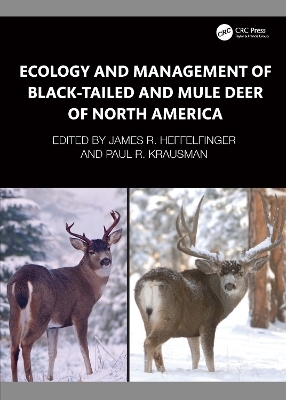
Ecology and Management of Black-tailed and Mule Deer of North America
CRC Press (Verlag)
978-1-032-40760-9 (ISBN)
Black-tailed and mule deer represent one of the largest distributions of mammals in North America and are symbols of the wide-open American West. Each chapter in this book was authored by the world’s leading experts on that topic. Both editors, James R. Heffelfinger and Paul R. Krausman, are widely published in the popular and scientific press and recipients of the O. C. Wallmo Award, given every two years to a leading black-tailed and mule deer expert who has made significant contributions to the conservation of this species. In addition, Heffelfinger has chaired the Mule Deer Working Group sponsored by the Western Association of Fish and Wildlife Agencies for more than 15 years. This working group consists of the leading black-tailed and mule deer experts from each of 24 states, provinces, and territories in western North America, putting them at the forefront of all conservation and much of the research on this species.
The book represents all current knowledge available on these deer, including how changing conditions such as fires, habitat alteration and loss, disease, climate change, socio-economic forces, energy development, and other aspects are influencing their distribution and abundance now and into the future. It takes a completely fresh look at all chapter topics. The revisions of distribution, taxonomy, evolution, behavior, and new and exciting work being done in deer nutrition, migration and movements, diseases, predation, and human dimensions are all assembled in this volume.
This book will instantly become the foundation for the latest information and management strategies to be implemented on the ground by practitioners and to inform the public. Although this book is about deer, the topics discussed influence most terrestrial wildlife worldwide, and the basic concepts in many of the chapters are applicable to other species.
James R. Heffelfinger is Wildlife Science Coordinator for Arizona Game and Fish Department and Full Research Scientist in the School of Natural Resources and the Environment at University of Arizona, Tucson. For the last 17 years, he has served as Chairman of the Mule Deer Working Group sponsored by the Western Association of Fish and Wildlife Agencies. This working group consists of the leading black-tailed or mule deer expert from each of 24 states, provinces, and territories in western North America. James is a Certified Wildlife Biologist, and recipient of the O. C. “Charlie” Wallmo Award for contributions to black-tailed and mule deer knowledge and conservation in North America, Mule Deer Foundation’s Professional of the Year Award, Lee Gladfelter Memorial Award, and Distinguished Alumnus University of Wisconsin – Stevens Point. He has authored and coauthored >65 scientific papers, 29 book chapters, 295 magazine articles, several TV scripts, and the book Deer of the Southwest published by Texas A&M University Press. Paul R. Krausman is Professor Emeritus from the School of Natural Resources and the Environment, University of Arizona, Tucson. Paul is a Certified Wildlife Biologist, Wildlife Fellow, Honorary Member of The Wildlife Society, and served as faculty advisor for the student chapters of The Wildlife Society at Auburn, Arizona, and Montana. He has served as editor, associate editor, and guest editor for numerous scientific outlets. Paul has published 41 book chapters, 14 books, >100 conference proceedings, and >270 peer-reviewed monographs and manuscripts. He has received numerous awards for his teaching and research including the O. C. “Charlie” Wallmo Award (1999), the Desert Ram Award (2000), and the Aldo Leopold Memorial Award (2006).
Section I. Biology and Ecology. 1. Origin, Classification, and Distribution. 2. Historical Trends in Black-Tailed Deer, Mule Deer, and their Habitats. 3. Physical Characteristics. 4. Digestive Physiology and Nutrition. 5. Modeling Population Dynamics of Black-tailed and Mule Deer. 6. Diseases and Parasites. 7. Carnivore-Prey Relationships. 8. Competition with Other Ungulates. Section II. Ecoregion Habitats and Population Dynamics. 9. Northern Forest Ecoregion. 10. Coastal Rainforest Ecoregion. 11. Intermountain West Ecoregion. 12. Great Plains Ecoregion. 13. California Chaparral and Oak Woodlands Ecoregion. 14. Southwest Deserts Ecoregion. 15. Colorado Plateau Shrubland and Forest Ecoregion. Section III. Population Management. 16. Population Monitoring. 17. Harvest Management. 18. Human Dimensions. Section IV. Habitat Management. 19. Conflict Management. 20. Threats to Habitat Function. 21. Habitat Improvement and Water Supplementation. 22. Migration. Section V. The Future. 23. Challenges and Opportunities for the Future Conservation of Black-Tailed and Mule Deer.
| Erscheinungsdatum | 28.04.2023 |
|---|---|
| Zusatzinfo | 33 Tables, black and white; 20 Line drawings, color; 13 Line drawings, black and white; 82 Halftones, color; 11 Halftones, black and white; 102 Illustrations, color; 24 Illustrations, black and white |
| Verlagsort | London |
| Sprache | englisch |
| Maße | 210 x 280 mm |
| Gewicht | 1620 g |
| Themenwelt | Naturwissenschaften ► Biologie ► Ökologie / Naturschutz |
| Naturwissenschaften ► Biologie ► Zoologie | |
| Technik ► Umwelttechnik / Biotechnologie | |
| Weitere Fachgebiete ► Land- / Forstwirtschaft / Fischerei | |
| ISBN-10 | 1-032-40760-3 / 1032407603 |
| ISBN-13 | 978-1-032-40760-9 / 9781032407609 |
| Zustand | Neuware |
| Informationen gemäß Produktsicherheitsverordnung (GPSR) | |
| Haben Sie eine Frage zum Produkt? |
aus dem Bereich


